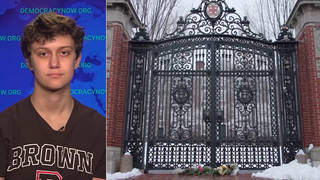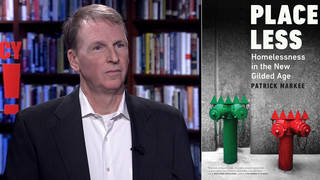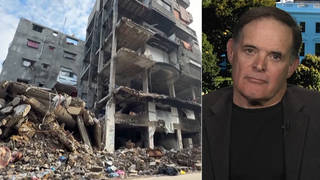
Topics
Nearly two years after the U.S. started bombing Afghanistan the country is still at war. We speak with author Anne Brodsky, Women for Afghan Women’s Masuda Sultan and we go to Afghanistan to hear from journalist Fariba Nawa. [Includes transcript]
Click here to read to full transcript
The Taliban is stepping up attacks on U.S. and coalition forces as Afghan citizens continue to be victims of violence.
According to the Washington Post, just over the border, in the town of Chaman, Pakistan, Taliban officials are organizing by having open meetings and handing out guns, money and motorbikes in exchange for planting landmines and bombs in Afghanistan.
Warlords also continue to dominate much of Kandahar and the illegal drug trade is flourishing.
A report recently released by Human Rights Watch describes evidence of human rights violations by U.S.-supported government officials. In southeast Afghanistan, observers note army and police troops kidnapping Afghans and holding them for ransom in unofficial prisons.
Police forces break into households and rob families. They extort shopkeepers, bus, truck and taxi drivers. There have been arbitrary arrests of journalists and death threats to media editors by local officials, army, police and intelligence agents. Political dissidents have also been subject to random detentions.
In parts of Kabul City, the report states that women, girls and boys are abducted in broad daylight outside of their homes and on their way to school. Women and girls have been raped in their homes in the evenings and during armed robberies.
The mounting instability comes as the country prepares for a nationwide debate on the new constitution. Representatives for the loya jirga, or grand council, are expected to convene in October for a constitutional convention.
Democracy Now! listeners may remember the story of Masuda Sultan. She was living in New York at the time of Sept. 11 and traveled back to Afghanistan a few months later only to learn a U.S. attack had killed 19 members of her families. She is currently traveling to Afghanistan to gain an understanding of the current situation. She is also a member of the organization women for afghan women.
- Masuda Sultan, program coordinator for Women for Afghan Women.
- Anne E. Brodsky, author of With All Our Strength: The Revolutionary Association of the Women of Afghanistan.
- Fariba Nawa, freelance writer and journalist joining us from Afghanistan.
TRANSCRIPT
AMY GOODMAN: Democracy Now! listeners and viewers may remember the story of Masuda Sultan, she was living in New York at the time of the September 11th attacks. And traveled back to Afghanistan a few months later with film maker, John Albert. There she learned that the U.S. military had bombed and killed 19 members of her family. She’s currently travelling back to Afghanistan to gain an understanding of the current situation. As a member of a new organization called Women for Afghan Women. And wants to be a part of the writing of that constitution along with other women.
She joins us in the studio just before she leaves, welcome to Democracy Now! Masuda
MASUDA SULTAN: Thank you for having me on again.
AMY GOODMAN: It’s good to have you with us. We’re also joined on the phone by Ann Brosdsky author of “With All Our Strength: The Revolutionary Association of the Women of Afghanistan and hope to speak with Fariba Nawa who is a freelance reporter in Afghanistan now. Talk about why you’re going back, you’re going to Kandahar, very dangerous place right now.
MASUDA SULTAN: Well, I have been working with women for Afghan Women advocating for women’s rights in Afghanistan and the inclusion of women in all of the reconstruction processes, political, economic, social, et cetera. I was in Afghanistan in March for international women’s day and found that it was celebrated by the women’s ministry in Kabul with full security and went outside of Kabul and found that women celebrating international women’s day in Afghanistan is a pretty sad thing because there’s not much that has changed since the fall of the Taliban for women outside of Kabul especially. So I am going back to gather women from all over the country, from the provinces, from the countryside, from Kabul, also in Kandahar, we thought it was important to go to Kandahar because as you may know, most of the international agencies, international peacekeepers, all of the western sort of N.G.O.'s are focused on Kabul because they cannot go outside. They're afraid to take that risk.
Our conference, our third annual conference is a statement to say that we are going to expand the focus not only to Kabul but we want to say, Kandahar is a place that needs attention, the second largest city in the country. It was the former strong hold of the Taliban so we thought it would be a real statement to have it there.
What we will do there is get like I said women will come together, the draft of the constitution should be released by September 1. It’s been delayed and that’s of concern, something I can get into later. But by then the draft will have been released the women will gather and look at the draft and look at the language concerning women and look at constitutions from other countries and make recommendations and changes and then present to the constitutional commission to the president and to the international community.
So that’s the main focus of the conference. It will also look at elections, we’ll have members of the election commission there to help figure out how will women be enabled. What will the circumstances be. What will be done to ensure their participation in the upcoming elections in June of 2004.
JUAN GONZALEZ: But much was made when the U.S. declared war and went into Afghanistan about the liberation of women that would occur. And you’re saying that, outside of Kabul basically that very little as changed is that because of problems within the existing government as well as the Taliban or just because they haven’t been able to control the countryside yet of the Taliban supporters?
MASUDA SULTAN: I think that the problem is attributable to a number of different factors. The main factor that women and Afghan men, most people have who have traveled there site security. There is simply not the environment for a woman to be able to go out. I was in Kandahar, I met a woman who was working with an N.G.O. doing hygiene classes out in the villages and she needed to work. She had no choice but she said if she didn’t, she would rather stay home. She said every day that I leave my house I’m worried that someone is going to come into my house and basically abduct or rape her daughters because of what she is doing.
So the threat, the fear is really what’s preventing them. It’s fear that is caused by the local warlords, local police and as we all know there are warlords in the government. So women see that and I don’t understand how they’re expected to cm out and risk their lives in that environment.
AMY GOODMAN: We’re joined also on the phone by an independent reporter who is been investigating the drug trade in Afghanistan. Can you talk about what you have found, Fariba?
FARIBA NAWA: Hi. I am in the western city of Herat right now. The drug trade is probably the biggest business in Afghanistan. It’s about 40% of the G.D.P. and most I would say many of the warlords who are in power right now have a hand in it. I’ve been working on a project for three weeks now and basically during the Taliban time the drug trade was pretty much open until 2000 when they banned cultivation.
But what I’m doing is working on the trafficking end. Most of the drugs are grown in the south and the east and then they come through here and go to Iran.
Where it is transported to Turkey and then turned into heroin and feeds about 90% of Europe and the world’s drug demand. Afghanistan right now if you ask what it’s known for it’s for the drug trade. And eradication efforts have been really unsuccessful. The British have taken the lead on it and they have tried to compensate farmers, but the latest controversy right now is that there are witnesses saying that they’re spraying fields of the opium to try to get rid of the cultivation.
And that’s against international law right now. The officials deny it. I’m trying to look into certain accusations and it’s a bit difficult because as you know this is somewhat of a dangerous assignment and everywhere I go, I tend to be a little conspicuous, a woman coming from the west and investigating.
Even though I wear the necessary clothing, it’s been a bit difficult. But I’m also focusing on women. And what they have been through, I would exaggerate to say maybe thousands of women I don’t know the numbers of widows who have lost their husbands and funds, traveling who are traffickers and are shot by the Iranian government or the Turkmenistan government which are the two borders here when they try to smuggle these drugs out of here.
AMY GOODMAN: The first page of a Human Rights Watch report, the first sentence says, “Afghan warlords and political strongmen supported by the United States and other nations are engendering a climate of fear in Afghanistan threatening efforts to adopt a new constitution that could derail national elections scheduled for mid 2004.” What about the role of the United States, Fariba Nawa what you see on the ground in Afghanistan with these warlords?
FARIBA NAWA: Where I am from, I am from the city right now is a very powerful leader, Ismael Khan he basically controls the west, President Karzai has tried to minimize his power but it has not been successful. The Americans have a base here, I think there are special forces and civil affairs officers.
But you hardly see them. They’re not very visible like they may be in Kandahar or Kabul. They sort of stay to themselves and they’re pulling out as far as I know the coalition forces are pulling out. The only soldiers staying here are the troops are the civilian affairs officers, ones who are working on reconstruction projects.
Because they see no need for safety and stability. Herat is very safe, probably the safest area in terms of there is a dictatorship here. Ismael Khan says You stay out of my way I stay out of yours. If you say anything against me then you will be punished. That’s how it works out here.
Basically the central government has no say for the most part in what goes on here. And neither do the Americans. But he’s able, he’s a very good politician in that he’s able to work Iran, the United States and the central government, he somehow makes them all keep him in power.
If the U.S. really wanted to they could kick Ismael Khan out but they don’t. Because he gives them intelligence information about the Taliban and Al Qaeda. That’s what’s happening out here.
As far as the rest of the country is concerned, I’m sure that your listeners are aware that the resistance movement is getting stronger. And it’s not just one I wouldn’t say it’s just the Taliban or Al Qaeda. There are a lot of discontent individuals in Afghanistan who are seeing that the United States is not living up to its bargain.
JUAN GONZALEZ: If I can I’d like to bring in also Ann Brodsky , she’s the author of “With All Our Strength: Revolutionary Association of the Women of Afghanistan. She is joining us by telephone, I would like to ask you in terms of the chaotic situation in Afghanistan could you tell us how the women’s organization there have managed to persevere and continue to struggle to achieve some measure of dignity and their rights?
ANNE BRODSKY: That really is the remarkable part of this story. I was just back in Afghanistan a month ago and it’s clear that women continue to have to fight for even the most basic rights and while Kabul is better than the rest of the country, women’s freedoms there are really quite minimal. As I describe in the book, the struggle for women’s rights has been ongoing for centuries in Afghanistan.
But the past 24 years have really seen the most marked threat to woman and a back slide caused by succession of brutal regimes from the Soviet Invasion through the Jehadi, the Taliban and now.
It’s just this context as well as the crimes that are documented by human rights watch and reported to me last month that are ongoing. That explains why the women don’t feel liberated or secure and why underground organizations for women like RAWA continue to be a necessity. Women are still being educated, women and girls are still in secret classes of RAWA, the classes themselves might not be secret from the family but the fact that they’re RAWA classes leap but the fact that there are classes is because there’s thousands and thousands of girls who aren’t allowed to go back to school because it’s too dangerous or there is not a school available in their neighborhood or they’re too old to go back or they have been married perhaps even by force under the Taliban and so they’re not eligible to be in the government schools.
Healthcare, basic supplies, income generating, all of those sorts of necessities of life are still having to be provided by organizations like RAWA and by women on the ground because international aid isn’t reaching the people.
And the government at this point is both corrupt because the warlords and also still unorganized and insecure itself so unable to provide for the people even those members of the government who would want to.
AMY GOODMAN:Masuda, as we wrap up you head to Afghanistan, we’ll follow you there, talk to you when you are there. How do you expect to get women’s voices into the writing of this constitution?
MASUDA SULTAN: Well, women’s rights in Afghanistan have to be phrased within an Islamic context. It’s sort of the only strategy that women have told us will work. And part of what this conference will do is develop a common language with these women to solidify their arguments so that, I was told by someone working very closely with the constitutional commission that at the constitutional Loya Jirga, well will have to be on the same page making the arguments in a solid way, meaning they all have to agree on the language. Because the loya jirga it is going to be taped, and that recording will be used to determine law in the country in the future.
They’re going to look at it when there are disagreements or misunderstandings or to gain clarification about what they meant. So it’s really important that women are on the same page. The other thing with our conference is that it’s not just women that we know as human rights leaders in Afghanistan, not the typical people you hear about. But also women who are uneducated, women who are from the provinces, women who we have never heard from before. And who face very different reality from that that we often hear about in Kabul.
So the other thing I wanted to say in terms of the U.S. role is amount of aid going to Afghanistan and security was one issue, but there simply isn’t enough money going to the right places in Afghanistan. If you look at East Timor, Rwanda, Bosnia there is average of $250 per head in Afghanistan it’s $75 per head. You just wonder why the United States is not investing in Afghanistan if it really means business.
AMY GOODMAN: Well, Iwant to thank you all for being with us. Masuda is with women for Afghan women. You’re website?
MASUDA SULTAN: Womenforafghan.org
AMY GOODMAN: and Ann Brodsky joining us from Afghanistan, and Fariba Nawa, freelance journalist investigating the drug trade there. You are listening to Democracy Now! When we come back we go to Bolivia, we’ll be joined by John Albert, film maker his new film on Bolivia will be shown tonight on PBS, John also was with Masuda when she returned to Afghanistan after September 11th. Stay with us.












Media Options